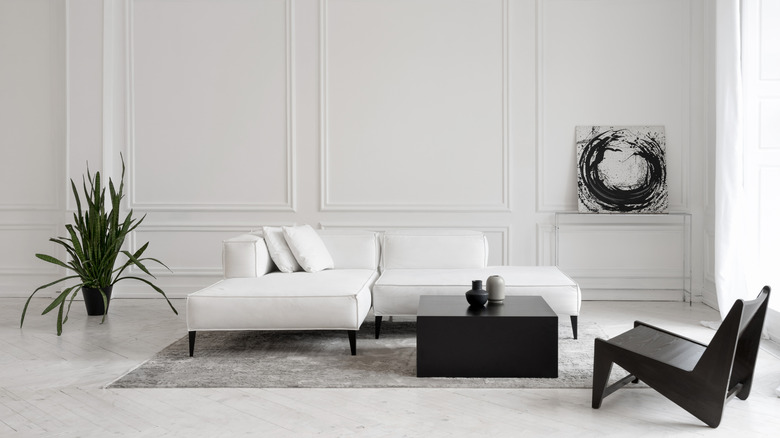The Art of Minimalism: Producing a Balanced and Peaceful Living Setting
The Art of Minimalism: Producing a Balanced and Peaceful Living Setting
Blog Article
Understanding Minimalism: Approaches for Decreasing Mess and Enhancing Clarity in Everyday Living
Minimalism is increasingly identified as a practical approach to improving clarity and focus in today's messy globe. By methodically examining our ownerships and focusing on intentionality, we can develop spaces that not just reflect our values however likewise promote psychological health.
Specifying Minimalism and Its Benefits
Defining minimalism includes understanding it as a way of life option that emphasizes simplicity and intentionality in both physical possessions and everyday regimens. At its core, minimalism motivates individuals to prioritize what really matters, enabling a much more significant and focused existence. By removing the non-essential, minimalism welcomes people to engage deeply with their experiences and surroundings.
The advantages of taking on a minimal technique are multifaceted. Firstly, it fosters psychological clearness, as reducing clutter in one's atmosphere can result in reduced disturbances and tension. When bordered by fewer belongings, individuals typically report enhanced concentration and improved efficiency. Minimalism promotes financial liberty; by focusing on requirements over wants, people can make even more enlightened purchasing decisions, leading to prospective savings and lowered debt. A minimalist lifestyle can yield emotional benefits, as it encourages people to grow gratitude for what they have instead than yearning for a lot more.
Inevitably, minimalism is not simply concerning material reduction but entails an alternative change in perspective, cultivating a life characterized by satisfaction, equilibrium, and function. Accepting this lifestyle can bring about profound modifications in how people perceive and communicate with the world around them.
Assessing Your Current Clutter
Clutter often manifests as a frustrating buildup of things that no longer serve a purpose, developing an obstacle to achieving a minimal lifestyle. To successfully examine your present clutter, it is important to take on an organized strategy. Begin by determining the areas in your home that feel disorderly or overwhelming. Remember of certain categories of things, such as apparel, books, or kitchenware, as this will assist you understand the scope of the mess.

In addition, take into consideration the frequency of usage for each thing. Eventually, understanding your current mess is an essential action towards embracing minimalism and improving quality in your everyday living.
Practical Decluttering Strategies
Having examined your existing mess, the following action is to apply sensible decluttering strategies that assist in an even more arranged living space. Minimalism. One efficient method is the "Four-Box" technique, where you mark 4 boxes classified: keep, donate, trash, and relocate. This technique encourages quick decision-making and guarantees items are categorized suitably
An additional method is the "One in, One out" regulation, which states that for each new thing gotten, an existing item should be removed. This principle assists maintain equilibrium and protects against build-up over time. Additionally, take into consideration the "30-Day Minimalism Video Game," where you eliminate one product on the initial day, 2 on the second, etc, cumulatively fostering a sense of achievement.
Restriction yourself to a details number of valued products, enabling you to appreciate their value without discover this overwhelming your space. By employing these methods, you can produce a much more calm and reliable living area, inevitably improving quality in your everyday life.
Creating Willful Rooms
Developing willful spaces includes a thoughtful method to how we style and arrange our environments, making sure each location offers a particular objective and mirrors our worths. from this source This practice is necessary in growing a sense of quality and function in our every day lives. By seriously analyzing the function of each room, we can remove diversions and improve our total well-being.
To develop deliberate rooms, start by identifying the main activities that will certainly happen in each location. As an example, a home workplace need to be developed to foster performance, integrating aspects such as appropriate lights, comfy furnishings, and marginal distractions. On the other hand, a relaxation location ought to advertise tranquility, featuring calming shades and comfortable seats.
Additionally, take into consideration the emotional influence of your surroundings (Minimalism). Integrating personal products that resonate with your worths, such as artwork or plants, can boost the connection to your room. Routinely evaluate these atmospheres to ensure they remain to offer their designated objective as your demands progress
Inevitably, creating deliberate areas has to do with making mindful choices that straighten with your way of living, advertising consistency and efficiency in your living and functioning environments.
Maintaining a Minimalist Frame Of Mind
Welcoming a minimalist attitude requires continuous representation and intentionality in our actions and ideas. This strategy involves growing recognition of our priorities and values, permitting us to filter distractions and focus on what genuinely matters. To maintain this state of mind, routine self-assessment anchor is essential. Reserve time to examine your commitments, properties, and even digital web content, ensuring they straighten with your core concepts.
This change in viewpoint encourages appreciation for simplicity, improving overall well-being. Integrating mindfulness strategies, such as reflection or journaling, can better reinforce a minimal mindset by promoting quality and minimizing psychological mess.
In addition, develop borders to shield your energy and time. Discover to state no to non-essential obligations and distractions that do not add to your individual development. Border yourself with like-minded people that sustain your minimalist trip, as shared values can improve inspiration and accountability.
Conclusion
In verdict, accepting minimalism offers considerable advantages, consisting of lowered mess and improved quality in day-to-day life. The principles of minimalism offer as beneficial tools for growing a setting that supports personal growth and health.

In addition, consider the "30-Day Minimalism Game," where you eliminate one product on the initial day, 2 on the 2nd, and so forth, cumulatively promoting a sense of achievement.
In verdict, accepting minimalism supplies substantial advantages, consisting of reduced mess and improved clearness in daily life.
Report this page